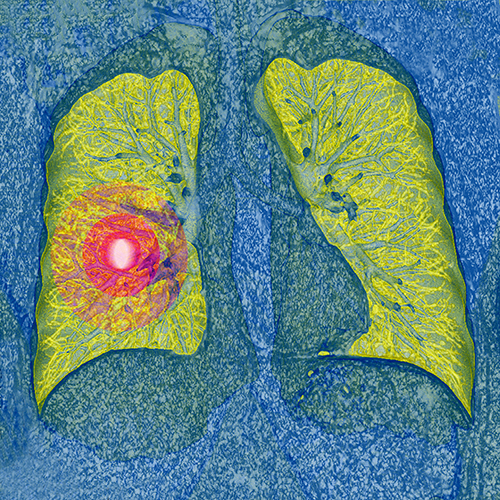
Results of a key Phase III study show that atezolizumab immunotherapy significantly improves overall survival (OS), relative to single-agent chemotherapy, in patients with advanced non-small-cell lung cancer (NSCLC) who are platinum ineligible, or unlikely to be able to tolerate standard platinum-based chemotherapy regimens.
The findings of the IPSOS study, which was led by University College London (UCL) and UCL Hospitals and sponsored by Roche, are “particularly significant considering that these patients, who are often seen in our clinics, have been excluded from all pivotal immunotherapy clinical trials conducted over the last decade,” said Professor Siow Ming Lee (UCL Cancer Institute and UCL Hospitals), who chaired the study Steering Committee and conceptualized the study design.
Lee and colleagues explain in The Lancet that although cancer immunotherapy has changed the treatment landscape for metastatic NSCLC, the clinical trials that led to the regulatory approval of these agents only included patients with a good Eastern Cooperative Oncology Group Performance Status (ECOG PS of 0–1), which are those who typically are able to carry out daily activities without difficulty. The patients in these trials also had a median age of 65 years or younger and were able to tolerate the toxicity associated with platinum-based chemotherapy.
However, more than 40% of patients with advanced NSCLC are in poor health and are often elderly with significant medical comorbidities. Treatment with standard platinum-doublet chemotherapy is not suitable for many of these patients because of poor tolerance or toxicity concerns, leaving them with limited treatment options. They are frequently treated with less effective single-agent chemotherapy or offered best supportive care.
Currently, most treatment guidelines do not recommend immunotherapy treatment due to lack of randomized results to indicate that it is safe, well tolerated and increases overall survival for this poor prognosis population.
To address this, Lee and team initiated IPSOS, the first Phase III randomized study examining the efficacy and safety of first-line immunotherapy in patients with stage IIIB or IV NSCLC ineligible for platinum-based chemotherapy due to an ECOG PS of 2 or 3, or alternatively, being 70 years or older with an ECOG PS of 0 or 1 but with substantial comorbidities or contraindications for platinum-doublet chemotherapy.
In all, 453 patients, recruited from 91 sites in 23 countries across Asia, Europe, North America, and South America, were randomly assigned to receive intravenous atezolizumab 1200 mg every 3 weeks (n=302) or single-agent chemotherapy with oral or intravenous vinorelbine or intravenous gemcitabine in 3- or 4-weekly cycles (n=151).
The researchers report that median overall survival (OS) was significantly longer among the patients who received atezolizumab, at 10.3 months, than among those given chemotherapy, at 9.2 months, with the difference corresponding to a significant 22% lower risk for death with atezolizumab than with chemotherapy.
Furthermore, twice as many patients who were treated with atezolizumab remained alive at 2 years compared with those treated with chemotherapy, at rates of 24% and 12%, respectively.
This difference was also statistically significant despite the “better-than-expected” median OS observed in the chemotherapy arm, Lee told Inside Precision Medicine. He noted that the result in the current chemotherapy arm was comparable to the OS survival achieved with standard doublet chemotherapy in multiple trials among people with an ECOG PS of 0 or 1.
“One possible explanation for this unexpected increased OS of 9.2 months observed in our trial could be the significant number of the patients in the chemotherapy arm who received subsequent immunotherapy, potentially diluting the true impact and results,” Lee suggests. Indeed, 56% of the chemotherapy patients who were still alive at 2 years had received immunotherapy following disease progression.
Subgroup analyses showed similar outcomes regardless of PD-L1 expression level, a biomarker that is often used to predict immunotherapy benefit.
The investigators also looked at patient-reported outcomes and found that atezolizumab was associated with clinically meaningful benefits in several health-related quality-of-life measures, including appetite loss, chest pain, dyspnea, and physical and social functioning.
In addition, there were fewer grade 3–4 treatment-related adverse events (16% of 300 vs 33% of 147) and treatment-related deaths (1% vs 3%) with atezolizumab than with chemotherapy.
The authors therefore conclude that their data “support atezolizumab monotherapy as a potential first-line treatment option for patients with advanced NSCLC who are ineligible for platinum-based chemotherapy.”
It is now up to the regulatory bodies to determine whether atezolizumab should be recommended as a standard of care in these patients.
In the meantime, Lee said: “It is encouraging to see the potential extension of immunotherapy option to our frail elderly ‘real world’ NSCLC population, as we commonly encounter in our clinical practice.
“While the findings demonstrate efficacy regardless of PD-L1 biomarker status, it is still important to further investigate the underlying mechanisms and to identify potential biomarkers that can select patients who will benefit the most and achieve better outcomes.”













